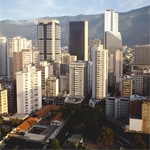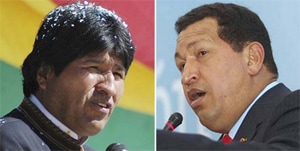In recent years, political risks facing multinationals have grown more significant. Corporations are far from blameless in creating that risk, though.
 |
|
Heightened tensions: Multinationals in countries such as Venezuela face growing risks. |
With oil prices continuing to defy gravity and tensions growing between oil-exporting countries and their customers, political risk has again become headline news. Parallels are being drawn between the current global economic and political plight and the 1970s, when Western multinationals also experienced a strong dose of political risk in the form of the 1973 oil crisis.
In October that year, OAPEC (Organization of Arab Petroleum Exporting Countries) member countries announced that they would not ship oil to those countries that had supported Israel in the Yom Kippur War against Syria and Egypt, among others. OAPEC members exercised their world price-setting powers and raised oil prices, which fanned inflationary pressures and triggered a recession.
In the same decade, further instability in the Middle East was precipitated by the 1979 Iranian revolution, which was preceded by a period of oil wealth that ultimately widened divisions between the upper and lower classes and increased public dissatisfaction with the ruling Shah. High oil prices also provided the trigger for a number of oil-rich countries to line their governments’ coffers by nationalizing oil holdings (in 1973, for example, the Qaddafi regime in Libya nationalized the Sarir oil field, the rights to which were initially granted to a Texan oil magnate).
As doing business in developing markets—particularly those countries that were home to oil and mining deposits—became increasingly risky and politically volatile, the political risk insurance market came into its own. OECD (Organization for Economic Cooperation and Development) countries set up national agencies to provide domestic companies with export credit and political risk insurance. The World Bank also established MIGA (the Multilateral Investment Guarantee Agency) in 1987 to foster north-south and south-south financing and investment activities by providing political risk guaranties. The private political insurance market also flourished with underwriters such as Lloyd’s of London and the American International Group (AIG) providing companies with coverage for currency inconvertibility, expropriation, war and political violence, non-payment and breach of contract.
Neil Henderson, director of political risk and crisis management for reinsurance intermediary Aon Global, says the political risk insurance market has approximately $1.5 billion in product capacity and that private insurers now play a larger role in the market than do export credit agencies. Political risk often manifests itself in the form of a political regime defaulting on a loan or oil-rich countries nationalizing or expropriating assets. “Nationalization is certainly more pronounced than ever before,” he notes. According to Henderson, research indicates that political risk is among the top five concerns for companies doing business in developing markets.
A Scared New World
The events of September 11, 2001, have also had a profound impact on the political risk landscape. “Prior to September 11, it was convenient to think that politics had gone away and that economic development was more important,” asserts Preston Keat, a political risk analyst with political risk advisory and consulting firm Eurasia Group. “But September 11 made people realize that geopolitics matters a lot.”
With oil prices having hit an unprecedented $140 a barrel and a resurgence of nationalistic fervor among oil-producing countries, Adam Strangfeld, deputy research director for Control Risks, a political, operational and security risk consultancy, believes 2008 has seen a return to the levels of political risk witnessed in the 1970s. “Increased commodity prices, particularly in oil, means increased political risk in terms of countries that are nationalizing assets. It is something we are seeing in Bolivia, Venezuela, Russia and Kazakhstan. It is similar to the 1970s when there was increased awareness of political risk with the OAPEC crisis and the revolution in Iran.”
Leftist-leaning political regimes in Venezuela and Bolivia have physically seized production facilities and assets pertaining to oil and gas production, forcing foreign companies to renegotiate their contracts. Venezuela reportedly voided drilling contracts with private companies at more than 30 oil fields, demanding a 60% stake for the state oil company. Ecuador has also moved to restrict “excessive profits” by foreign crude producers. “Commodity prices have to be high for it to be worthwhile for a host government to nationalize or expropriate assets,” observes Elizabeth Stephens, a political risk analyst with insurance firm Jardine Lloyd Thompson.
Stephens says the highest risk foreign firms face is not expropriation of assets but “contract repudiation” and points to the recent example of Kazakhstan, which froze the accounts of the international consortium developing the Karachaganak gas and condensate field. She says the official reason given was “non-compliance with tax payments over environmental regulations, or unauthorized associated gas emissions.” A $14.9 million fine was levied, which the international consortium, including BG, Eni, Chevron and Lukoil, contested. According to Stephens, the case was settled in January this year when the consortium agreed to pay Kazakhstan $2.5 billion to $4.5 billion in compensation for the project’s late start, as well as granting shares to the national oil company KazMunaiGas, which saw its stake double to 16.8%, equaling the holdings of the largest Western members of the consortium.
 |
|
|
New Risks Abound
Eurasia Group’s Keat says firms should also look out for “predatory regulation”—changing taxation and export laws. “South Korea, for example, opened up its domestic banking sector to foreign investment,” he explains. “Now these investments are being questioned as a way of trying to force foreign investors out of the market.”
While history may be repeating itself with a return to 1970s-style political risk, newer forms of risk are also emerging, driven by the seismic shifts that are occurring in global asset and investment flows. “It used to be rich countries investing in poor countries, but now the dynamics of investment are changing,” notes Keat. “Suddenly the investor is not a hedge fund in New York anymore, but the government of China or Kuwait, which adds a new dimension to political risk.”
Stephens says that in 2007 approximately 33% of FDI was so-called south-to-south investment—emerging markets investing in one another. “They don’t have to rely on Western money anymore, which is changing the economic balance of power and injecting a new layer of political risk in business,” she asserts. For example, with China investing heavily in South Africa, Stephens says it is increasing the political risk profile of Western companies. “If China is going to invest $3 billion in South Africa, as a Western company you could be at a disadvantage, as the host government now has an alternative source of investment with no strings attached.”
In addition to the major winds of change that are blowing from the East toward the West as the economic balance of power shifts, a number of macro-political events are also unfolding. Keat points to the forthcoming US election, which, if Republican candidate John McCain wins, could result in more concerns emerging about Iran. “If Democratic candidate Barack Obama gets elected, we could see a return to protectionism and changes in regulation,” he says.
In Russia, while there was a smooth political transition to the new president, Keat says the way in which power operates is a “puzzle,” as former president Vladimir Putin still appears to be very much in control. He also points to what he calls a constitutional crisis in Turkey, where he says the national political situation has worsened, resulting in efforts to ban the ruling AKP party. “This is likely to have more of an impact on capital markets investment than whether a company wants to set up a factory there,” he says.
 |
|
Stephens: The highest risk foreign firms face is “contract repudiation”. |
Companies Create Risk
According to Control Risks’ 2008 Risk Map, there are some 57% of emerging markets that have a political risk rating of medium high or extremely high, which Strangfeld says is significant as emerging markets are of critical importance to business because of natural resources and manufacturing. So in their quest for new markets, natural resources and low cost centers of production, are companies destined to remain hapless victims of political risk?
Keat says that, through the simple process of engagement with host governments, companies can mitigate these risks. “What some mining or extractive companies do is that over a 10- or 15-year period they offer to give the asset back to the government,” he explains. “It also helps if you work with local partners that are making generous profits.” For example, in the controversial Sakhalin Island oil and gas development project, Keat says companies like Conoco, which worked with a local partner, fared better than Royal Dutch Shell and other oil majors, which went it alone and were later forced to sell assets by the Russian government.
“Companies like to think they are the victims, but if they are going into Africa developing a mining project, they are helping create the risk landscape,” Jardine Lloyd Thompson’s Stephens points out. She adds that when companies in extractive industry sectors are drafting agreements with host governments, they should include a more equitable equity share in order to head off any attempts by the government to forcibly renegotiate terms later on. “If oil prices are low, the host government should get 50%, for example, and if commodity prices are high, the percentage the government gets should reflect that,” she explains. “The government and the company need to profit in good times. The more a company understands the different components of risk and managing them positively, it is possible to mitigate them.”
For companies in the oil, gas and mining sectors, factoring in political risk is very much a part of doing business. “Extractive companies have always been aware of political risk,” says Keat. “They cannot help where natural resource deposits are. It is not as if they can go to another country. They are where they are.”
Yet with political risk becoming more pervasive and taking on new forms, the threat is no longer confined to just oil and mining majors. Increasingly it seems that any company looking to do business in developing markets needs to factor political volatility into the equation. “Companies outside the mining and oil sectors tend to look at political risk when they first enter a market, but then they don’t continue to monitor it,” says Keat. “Their supply chain is then put in jeopardy. There is inconsistent monitoring of political and regulatory risks. But in a competitive environment those companies that seriously monitor political risk are more likely to get their products to market.”
Anita Hawser



